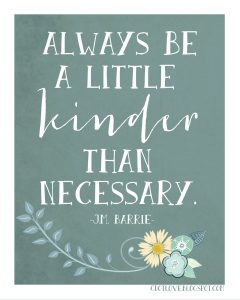Today, on National Compliment Day, I can’t help thinking of a Mark Twain quote that I love: “I can live for two months on a good compliment.”
 That’s a sentiment I totally understand. As a “words of affirmation” kind of gal, compliments mean so much to me. (If you’re unfamiliar with the 5 Love Languages, you can find out yours — as well as what the Love Languages are all about — here.) I can say in complete truthfulness that I remember just about every single compliment I receive — and I’ll love the compliment giver forever because of it.
That’s a sentiment I totally understand. As a “words of affirmation” kind of gal, compliments mean so much to me. (If you’re unfamiliar with the 5 Love Languages, you can find out yours — as well as what the Love Languages are all about — here.) I can say in complete truthfulness that I remember just about every single compliment I receive — and I’ll love the compliment giver forever because of it.
As I’ve written about before, I’ve never had the greatest self-esteem (although I like to think it’s getting better), and growing up, this was especially true. I was an overweight child and pre-teen, and being labeled “fat” and “ugly” scarred me to my core. Due to words that were probably uttered without a second thought, I’ve spent a great deal of my life struggling with image issues and feelings of low self-worth based on my looks.
Because of those experiences (and many others along the way), I recognize that words are incredibly powerful. We can use them to hurt or to heal, to wound or to strengthen. President Gordon B. Hinckley once said:
“There is a sad tendency in our world today for persons to cut one another down. Did you ever realize that it does not take very much in the way of brainpower to make remarks that may wound another? Try the opposite of that. Try handing out compliments.”
Have you ever seen those videos or read vignettes that show the chain reaction of being cruel to someone? They go something like this: “Bob, who is angry because he stubbed his toe, yells at his wife. His wife becomes agitated and yells at their young son. Their son is upset and kicks the neighbor. The neighbor gets mad and yells at the mailman.” The list could go on and on.
Yes, unkindness often begets unkindness — but the opposite is true, too. An act of kindness, no matter how simple, often inspires another. And as we “hand out compliments” or acts of kindness, we’ll often find that our own day improves, too! It’s a win/win.
Take this video, for example. Even though it’s clearly dramatized, the principle it teaches is powerful: kindness leads to more kindness.
As we go out of our way to show goodness and genuine warmth to those around us — often by simply extending a kind, encouraging word — our little corner of the world becomes a bit brighter.
A December 1982 Ensign article entitled “One-a-Day Compliments” emphasizes the importance of complimenting children, but I think the advice applies to adults as well. It reads:
“One day I was visiting with a mother of seven grown children, all active, confident members of the Church. As a young mother anxious for help and advice, I questioned her about her secrets of success. One of her most impressive answers was: “I tried to genuinely compliment each child on something he or she did well every day.”
How often we ignore the good behavior of our children and comment only on their mistakes and misbehavior! To grow to be of value to himself and society, a child needs to think well of himself. He needs to see himself as an important person and know that he has abilities and skills.
Compliments go a long way toward improving a child’s self-esteem.”
When I was four years old, my paternal grandmother came to live with us and stayed until I was just shy of 12 years old. While there are a lot of things from those years that I can’t recall, I will never forget how often she told me that I was kind. Because she emphasized that, I began to believe it — and to this day, it remains an integral part of my identity. While I’ve struggled with other aspects of who I am (namely, my looks), I’ve always believed that I am a kind and loving person.

To read more of Amy’s articles, click here.
Would I be a kind person, or at least believe that about myself, without having received that compliment from my grandmother (especially with such frequency)? How grateful I am that I will never have to know.
While clearly compliments are extremely formative in our childhood years, I believe they continue to inspire and shape us when we receive them as adults. They are important because they help us feel validated and valued, loved and appreciated — plus, they enable us to feel more comfortable not just in our own skin, but in our relationships and community as well.
In Happify.com’s article, “Want to Feel More Positive? Learn to Give Genuine Compliments,” we’re taught:
“Compliments don’t just make others feel great. They also enhance our own self-confidence. Giving a genuine compliment requires us to look for the good in others. In doing so, we also start to see the good in ourselves. We realize that we are all on the same journey together and that each of us has value to share with the world.”
So please, as Patty reminded us only a few days ago, “[b]e the rainbow in someone else’s cloud” today. Extend an encouraging word to someone — or multiple someones! — as you remember on National Compliment Day the worth of a kind word for both the giver and the receiver.
Every time you give a compliment, I hope you remember that while your words may not change someone’s life, they will certainly change their day for the better.
And be ye kind one to another, tenderhearted, forgiving one another, even as God for Christ’s sake hath forgiven you” (Ephesians 4:32, emphasis added).
About Amy Carpenter
Amy Carpenter is the site manager and editor for LDSBlogs.com. She served a full-time mission for The Church of Jesus Christ of Latter-day Saints in Denver, Colorado, where she learned to love mountains and despise snow. She has a passion for peanut butter, dancing badly, and most of all, the gospel.
Twitter •






